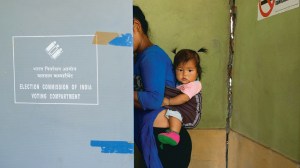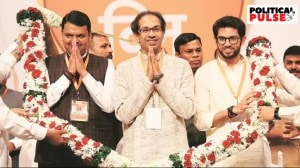- India
- International
After hooch tragedy, Bihar’s anti-liquor machinery is burdened and breathless
Searching under car seats, looking out for bulging luggage at airport, opening deaddiction centres overnight, and chasing youngsters with a handful of breathalysers. A hooch tragedy later, Indian Express finds Bihar’s anti-liquor machinery burdened and breathless
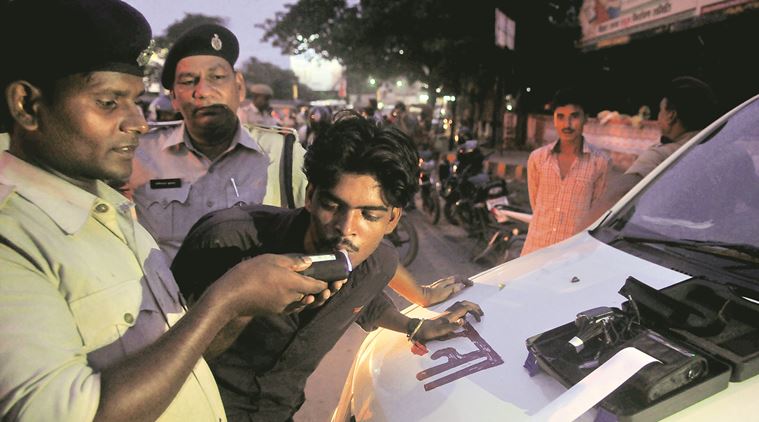 At a drive against drink driving at the Income Tax Roundabout in Patna. With barely 500-odd breathalysers for the entire state, the police have to often depend on the traffic police. Prashant Ravi
At a drive against drink driving at the Income Tax Roundabout in Patna. With barely 500-odd breathalysers for the entire state, the police have to often depend on the traffic police. Prashant Ravi
WHEN 16 people died between August 16 and 18 after drinking spurious alcohol in Gopalganj district of Bihar, the first such tragedy after the state imposed prohibition in April, the initial heads to roll were of policemen: 25 of them suspended for ‘negligence of duty’.
Four months after the state passed the Bihar Excise (Amendment) Act, 2016, officials of the police and the excise departments say they find themselves stretched — and a little confused.

“It’s a strange situation. If you catch people with liquor too often, seniors ask us to explain why so many people are still drinking. They say we aren’t vigilant enough. And when there are no arrests for a few days, they say we are not doing our jobs,” says an officer at the Phulwari Sharif police station in Patna.
The brief from the police headquarters to all police stations is to combine surprise anti-liquor inspections with routine patrolling, with the exercise monitored at the level of the Deputy Inspector General.
So far, the police have conducted close to 50,000 raids across the state, arrested over 4,000 people and seized over 1.84 lakh litres of alcohol.

The Excise Department has around 120 teams of its own across the state. Patna Excise Assistant Commissioner Krishna Kumar says, “From April till July, we sent 338 people to jail, and seized 836 litres of mahua liquor, 9,000 kg raw mahua, 604 litres of IMFL and 361 litres of beer.”
On the ground, the prohibition drive has stretched Bihar’s depleted police force. From law and order duties to routine investigation, court duties to clearing traffic jams, police officers say they already had their hands full and that the anti-liquor drive is an added burden. With 85,000 personnel, Bihar’s police strength is way below the national average of 110 policemen per one lakh population.
Police stations often depend on the traffic police to combine anti-liquor drives with routine vehicle checks. Many of the lower-rung staff say they have to work beyond their shifts.
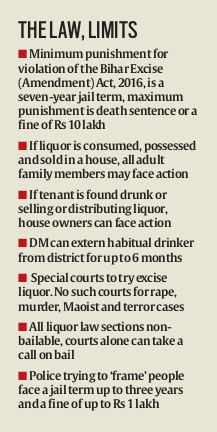
Patna police say they don’t even have enough breathalysers. The city traffic police has 65 such devices and the Excise Department in the city has nine of them. About a dozen machines are non-functional. The situation is worse outside the capital — over 850 police stations in the state continue to wait for these machines.
“Since we don’t have enough breathalysers, we take blood samples of people reeking of alcohol,” says a senior police officer based in Aurangabad.
The stress is beginning to show. Recently, the Bihar Police Association took up the cause of 11 SHOs who were suspended for “dereliction of duty”. Over hundred SHOs have asked to be relieved of their duties.
Bihar DGP P K Thakur says the police are doing their job well despite these “challenges”.
The Sunday Express watches the prohibition machinery at work in four spots across the state.
Border Checkpoint
Hazaribagh-Gaya border
THE vehicle boots swing open. A quick rummage, a peep in between the seats, a look at the dashboard, a nod and a wave of the hand.
Bihar’s battle against the bottle begins here, at this temporary check-post in Dobhi on National Highway 2, nearly 45 km inside the state’s border with Jharkhand. This Saturday evening — like on many other evenings since April 1, when Bihar imposed prohibition in the state — Sub-Inspector Anil Kumar Singh and his team from the Barachatti police station in Gaya, Bihar, are waving down vehicles, mostly cars, to make sure no alcohol is smuggled in from Jharkhand.
Though Singh and his team are supposed to check all vehicles, the four-wheelers usually get singled out. “Smugglers prefer four-wheelers because they can get away easily if caught. Besides, it’s easy to hide the stuff,” he says. “They create spaces under the seat covers or have special cavities in the boot. We once seized liquor hidden in the bladder of a football and, in another case, in the tube of a Bolero tyre.” Singh says they have seized around a dozen vehicles since the ban came into effect.
Today, three constables, a check-post police staff, a driver and a couple of private security men are part of Singh’s team. There are around five such border check-points across the state.
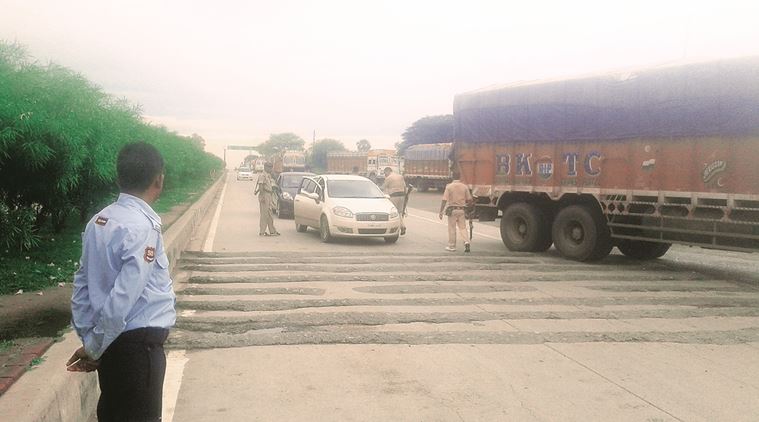 At a border checkpoint, cars are usually singled out for checks. Prashant Pandey
At a border checkpoint, cars are usually singled out for checks. Prashant Pandey
At 4.15 pm, a bus loaded with passengers reaches the check-post. The bus slows down, a constable from Singh’s team goes in for a cursory check and it is allowed to go.
The constable says it’s impossible to carry out extensive checks on buses, particularly when they are full. “That creates traffic jams. We have seized liquor from buses too, but nobody claims the bag with the liquor, and ultimately, only a seizure memo is prepared,” he says.
In the four months since the drive began, Singh has realised that the law can be uneven. So when a convoy of vehicles carrying passengers of Baba Dham (devotees of Lord Shiva going on a pilgrimage to Deoghar, Jharkhand) arrives, it is waved through the post without checks. “It could lead to unpleasant situations,” says Singh.
So far, the proceedings at the checkpost have been dull, but there have been days with some thrills and spills. On the night of July 17, a Swift Dezire broke into two after hitting the divider at 71st Mile in the Barachatti police station area. “All the bottles inside got smashed and the alcohol spilled onto the road. There were two people in the vehicle and, miraculously, they escaped,” says Sanjay Kumar, who works at an eatery nearby.
At the Dobhi checkpost, the team springs into action. Singh has got a call from his senior, Inspector (Barachatti station), Raj Kumar Tiwari, alerting him about a tip-off: a person in a nearby village has stocked up some liquor. Singh and the constable get into a Bolero with a Jharkhand number — it’s one of the vehicles the team has seized — and they speed away. The anti-liquor drive at the check-post stops.
Within a couple of minutes, however, the Bolero returns, the policemen take positions at the check-post and the barricade is rolled out into the middle of the road. “We were on our way when we got a call from Inspector sir, asking us to come back. A Swift Dezire with a Patna number has been spotted passing the (Barachatti) police station at great speed. We suspect he is either drunk or is moving around with alcohol. We have to watch out for a white car,” says Singh.
For the next few minutes, no white car goes through the barricades unchecked. Some 10 minutes later, with the offending car nowhere in sight, Singh decides to go back to the village in pursuit of the earlier tip-off. The checking stops again.
Around 15 km from the checkpost is the Barachatti police station, the first one on Bihar’s border with Jharkhand. Within the compound are several SUVs, all seized in liquor raids. “Every day, we seize one or two vehicles,” says Inspector Tiwari, who is in charge of the police station.
Since April, they have also seized 1,710 litres of IMFL, 381 litres of country-made mahua and 2,662 litres of country-made liquor in pouches, all from the Barachatti police station area. The police have registered 36 cases and arrested 58 people.
Inspector Tiwari admits that “putting a complete stop to smuggling is not easy”. “Manpower is needed. This (liquor raids) is not the only thing we do. We have the usual police station work — crime patrol, attending court proceedings, etc,” he says.
Drive Against Drink Driving
I-T roundabout, Patna
“Kya hai yeh, sir (what is this, sir),” asks Raja Anand, 19, somewhat startled at the breathalyser the police have thrust in his face. It’s a sobriety drive at the Income Tax Roundabout in Patna and the breathalyser, one of 500-odd such machines deployed by the police in the state, is a key weapon in the JD(U)-RJD government’s war on the bottle.
Inspector Avinash Kumar of Kotwali police station, whose team of 12 policemen have combined a vehicle inspection drive with a surprise check on drink driving, has just flagged down Raja’s motorcycle. “This machine will tell us if you have been drinking,” says Kumar. “Kuchh rahega tab na niklega… boliye kya karna hai (What will it show if there’s nothing to show? Anyway, what do you want me to do),” replies Anand. One of the constables gives Kumar a demo and he follows: cheeks puffed, he blows hard into the breathalyser. All clear.
The police tell the Class 12 commerce student he can leave but he hangs around for a while. “Sir, my parents should know that I have gone through this test. They should know their son is only into studies and has no vices,” he says.
Over the next few minutes, Inspector Kumar and his team stop more people. Two bikers— one of them sporting earrings and a fancy haircut — get a lecture from Kumar on their “Sultan haircut” and bike driving. Inder Yadav, a daily wager from Brahmpur, Buxar, who works as a construction worker in Patna, is stopped and asked if the roasted gram he is eating from a paper cone is chakhna (a desi snack usually eaten with a drink). “No, sir. I was hungry after my day’s work. I do not drink,” he says.
Two hours into the drive, the machine still hasn’t yet found one culprit. Kumar believes that’s a good sign. “This shows the liquor law is effective… you can see people are scared,” he says.
Deaddiction Centre
Sadar Hospital, Jehanabad
Data operator Ranjeet Kumar is the only man at work this Sunday morning at the Nasha Mukti Kendra (deaddiction centre) in Jehanabad. The 10-bed ward at the centre, located within the premises of the Sadar hospital, has been locked from outside and the doctor on duty has taken the day off.
After the prohibition policy came into effect, the state government, realising that the de-addiction of hundreds of alcoholics would pose a challenge, opened 39 such centres, one each in 37 district headquarters and two in Patna. The government also said doctors at these centres would be trained by experts from Bengaluru’s NIMHANS and Patna’s AIIMS. According to the Bihar State Health Society of the Bihar government, by July, over 5,000 patients had reported at deaddiction centres across the state capital. But now, four months into the ban, the numbers are down to a trickle. It’s been over a month since anyone walked into the Jehanabad centre. The building that houses the Jehanabad centre was earlier the site of the National Rehabilitaion Centre.
Data operator Kumar, who has to compile daily data of patients admitted, says that between April 6 and August 6, 149 patients registered themselves at the centre, of whom 102 were alcoholics who complained of withdrawal symptoms. “A lot of these patients came between April and June. Since July, we haven’t been getting any alcoholics; only drug addicts come for counselling,” says the data operator.
Speaking on the phone, Dr Vidyabhushan Prasad says that it takes 20 days to two months to “fully counsel” liquor-addicts. “So far, we have only got four serious patients, who were referred to Patna Medical College Hospital (PMCH) and other medical hospitals.” At least 50 patients who came to the centre were counselled and sent off – essentially, the doctor on duty counsels them on the ills of alcoholism and hands them pamphlets talking about the “social evil”.
But while numbers are falling, there have been a number of alcohol-related deaths across the state. Over a dozen people who registered themselves at deaddiction centres have died since the ban came into force, though doctors have been attributing these deaths to old ailments such as liver failure.
Among those who died was Ajay Mistri. The 22-year-old from Teni Bigaha village near Jehanabad railway station was brought to the centre on April 8 and referred to PMCH, where he was treated for a week. His brother Dhananjay Mistri says, “Ajay died on July 27. We took him to PMCH, but nothing helped.” The Jehanabad centre, however, has not recorded Ajay’s death.
Excise Counter
Patna Airport
Blink and you lose. That’s the strategy Inspector Randhir Kumar Singh has been adopting to check if passengers alighting at the Patna airport are carrying liquor – and, he likes to believe, it has been working. “We look right into the eyes of random passengers. If they look away, we make them open their bags,” says Kumar, a police inspector with the state Excise Department who mans an 8×6 foot cabin at the arrival terminal of the Patna airport, from where he can watch passengers moving towards the exit.
The airport is a strategic location for the state government’s prohibition drive. About 4,000 passengers move in and out of the airport with 40 flights in operation. And in case any of them averts Inspector Singh’s steely gaze, the writing is on the wall: there are four notices at the airport that spell out the government’s prohibition policy.
Though airline companies across the country have been asked not to allow Patna-bound passengers to carry liquor with their luggage, officials of the CISF and the Excise Department don’t let their guard down. “We watch their luggage. In case we think it has an awkward bulge, we make them open it,” says Inspector Singh, as he moves towards the conveyor belt and randomly lifts bags and puts them back on the belt.
From April 14, 2016, the day the Excise Department started its checks at Patna airport, till July 31, 33 passengers had either voluntarily deposited their bottles or had been forced to do so. Singh says several of these bottles were ‘Foreign Made Foreign Liquor (FMFL)’, mostly seized from passengers flying out of Patna.
Though the Excise Department has not registered any case so far, Singh says it is well within its rights to do so in case someone refuses to deposit his bottle.
He then goes on to narrate tales of tussle.
“On May 25, we stopped a passenger who was carrying four ‘FMFL’ bottles from Patna to Delhi. She argued with us, saying these bottles cost about Rs 50,000. So we gave her an option: either she surrenders her bottles to us or surrenders herself to the police. She went with the first option,” says Singh, laughing at his own joke.
Singh says there are now fewer seizures at the airport. While there were six instances of liquor bottles being seized in July, there has been no case in August.
“Par tight rahna padta hai (but we have to maintain vigil),” says Singh, adjusting his cap and leaving for another round at the conveyor belt.
Apr 19: Latest News
- 01
- 02
- 03
- 04
- 05















